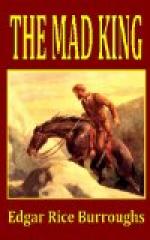On he raced toward the south, his speed often necessarily diminished upon the winding mountain roads, but for the most part clinging to a reckless mileage that caused the few natives he encountered to flee to the safety of the bordering fields, there to stand in open-mouthed awe.
Halfway between Tafelberg and the crossroad into which he purposed turning to the west toward Tann there is an S-curve where the bases of two small hills meet. The road here is narrow and treacherous—fifteen miles an hour is almost a reckless speed at which to travel around the curves of the S. Beyond are open fields upon either side of the road.
Barney took the turns carefully and had just emerged into the last leg of the S when he saw, to his consternation, a half-dozen Austrian infantrymen lolling beside the road. An officer stood near them talking with a sergeant. To turn back in that narrow road was impossible. He could only go ahead and trust to his uniform and the military car to carry him safely through. Before he reached the group of soldiers the fields upon either hand came into view. They were dotted with tents, wagons, motor-vans and artillery. What did it mean? What was this Austrian army doing in Lutha?
Already the officer had seen him. This was doubtless an outpost, however clumsily placed it might be for strategic purposes. To pass it was Barney’s only hope. He had passed through one Austrian army—why not another? He approached the outpost at a moderate rate of speed—to tear toward it at the rate his heart desired would be to awaken not suspicion only but positive conviction that his purposes and motives were ulterior.
The officer stepped toward the road as though to halt him. Barney pretended to be fussing with some refractory piece of controlling mechanism beneath the cowl—apparently he did not see the officer. He was just opposite him when the latter shouted to him. Barney straightened up quickly and saluted, but did not stop.
“Halt!” cried the officer.
Barney pointed down the road in the direction in which he was headed.
“Halt!” repeated the officer, running to the car.
Barney glanced ahead. Two hundred yards farther on was another post—beyond that he saw no soldiers. He turned and shouted a volley of intentionally unintelligible jargon at the officer, continuing to point ahead of him.
He hoped to confuse the man for the few seconds necessary for him to reach the last post. If the soldiers there saw that he had been permitted to pass through the first they doubtless would not hinder his further passage. That they were watching him Barney could see.
He had passed the officer now. There was no necessity for dalliance. He pressed the accelerator down a trifle. The car moved forward at increased speed. A final angry shout broke from the officer behind him, followed by a quick command. Barney did not have to wait long to learn the tenor of the order, for almost immediately a shot sounded from behind and a bullet whirred above his head. Another shot and another followed.




